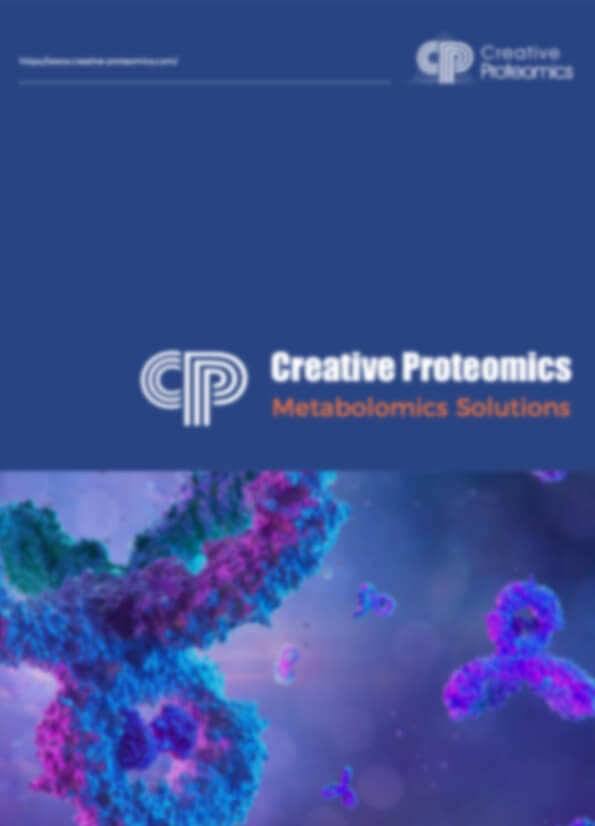Alpha-Ketoglutaric Acid Analysis Service
Alpha-Ketoglutaric Acid (α-KG), a vital TCA cycle metabolite, is crucial for cancer, mitochondrial, and aging research. Creative Proteomics offers precise α-KG detection using LC-MS/MS, UHPLC, and GC-MS, with sensitivity down to 0.01 ng/mL. Services include quantification, metabolic profiling, and isotope tracing, supporting IDH mutation studies, microbial optimization, and dietary research. Integrated multi-omics and regulatory-compliant reporting deliver reliable data for research and industry.
Submit Your Request Now
×- What We Provide
- Technology Platform
- Advantages
- Sample Requirements
- Demo
- FAQs
- Publications
What is α-Ketoglutaric Acid?
α-Ketoglutaric acid (α-KG) is a pivotal intermediate in the tricarboxylic acid (TCA) cycle, playing essential roles in cellular energy production, amino acid synthesis, and epigenetic regulation. As a key metabolic hub, it serves as a substrate for multiple enzymes (e.g., α-KG-dependent dioxygenases) and participates in redox balance maintenance. Dysregulation of α-KG levels is linked to mitochondrial disorders, cancer progression, and aging-related pathologies. Accurate quantification of α-KG is critical for understanding metabolic flux dynamics in research areas ranging from oncology to nutraceutical development. Creative Proteomics can quantify and characterize α-ketoglutaric acid in various biological samples
α-Ketoglutaric Acid Analysis Services Provided by Creative Proteomics
Quantitative Measurement: Accurate determination of α-Ketoglutaric acid concentrations in biological samples such as serum, plasma, urine, and tissues.
Metabolomics Profiling: Comprehensive analysis of α-Ketoglutaric acid alongside other metabolites to assess metabolic pathways and alterations.
Pathway Analysis: Detailed insights into the role of α-Ketoglutaric acid in metabolic and disease pathways, including cancer and neurodegeneration.
Isoform Detection: Identification and quantification of α-Ketoglutaric acid isoforms and related derivatives.
Isotopic Labeling: Tracking the fate of α-Ketoglutaric acid in metabolic studies using stable isotopes.
Custom Solutions: Tailored analysis services designed to meet specific research or clinical needs.
List of Detected α-Ketoglutaric Acid and Related Compounds
| Compound | Detection Method | Application Area |
|---|---|---|
| α-Ketoglutaric Acid | LC-MS, GC-MS, NMR | Metabolomics, Biochemistry |
| Glutamate | LC-MS, HPLC | Neurochemistry, Neurodegeneration |
| Glutamine | LC-MS, HPLC | Metabolism, Clinical Research |
| Succinic Acid | GC-MS, LC-MS | Energy Metabolism, Cancer Studies |
| Citrate | HPLC, LC-MS | TCA Cycle, Metabolic Studies |
| Malate | LC-MS, GC-MS | Biochemistry, Metabolism Studies |
Methods for α-Ketoglutaric Acid Detection
High-Performance Liquid Chromatography (HPLC)
Instrument: Agilent 1260 Infinity
Key Parameters:
- Column: A C18 column (e.g., Waters BEH C18, 1.7 µm) is recommended for baseline separation of α-KG from isobaric metabolites 4.
- Detection: UV detection at 210 nm or diode array detectors (DAD) are commonly employed.
Liquid Chromatography-Mass Spectrometry (LC-MS)
Instrument: Thermo Scientific Q Exactive HF-X Orbitrap.
Key Parameters:
- Ionization Mode: Electrospray ionization (ESI) in negative mode, targeting the [M-H]⁻ ion of α-KG at m/z 145.01.
- Quantification: A dynamic range of 0.1–500 µM is achievable with isotope-labeled internal standards (e.g., ¹³C-α-KG) for calibration.
Gas Chromatography-Mass Spectrometry (GC-MS)
Instrument: Agilent 7890B GC with Agilent 5977A MSD
Key Parameters:
- Derivatization: Trimethylsilyl (TMS) derivatives improve detection sensitivity.
- Separation: A DB-5MS column (30 m × 0.25 mm) with a temperature gradient (50°C to 300°C) achieves baseline separation of α-KG from organic acids like fumarate or malate.

Agilent 1260 Infinity II HPLC (Fig from Agilent)

Q Exactive™ HF-X Hybrid Quadrupole-Orbitrap™ Mass Spectrometer (Fig from Thermo Fisher)

Agilent 7890B Gas chromatography system (Fig from Agilent)
Advantages of Our α-Ketoglutaric Acid Detection
- Ultra-High Sensitivity: LC-MS/MS (SCIEX Triple Quad 6500+) achieves detection limits as low as 0.01 ng/mL, ideal for trace-level α- ketoglutaric acid quantification in complex matrices like CSF or microbial lysates.
- Multi-Platform Validation: Cross-verified results using UHPLC (Waters ACQUITY) and GC-MS (Agilent 8890/5977B) ensure method robustness and data reproducibility.
- Matrix Flexibility: Pre-validated protocols for diverse samples—serum, tissue, cell cultures, urine, and soil extracts—with recovery rates >95%.
- Isotope-Resolved Precision: ¹³C/²H-labeled α- ketoglutaric acid tracing via GC-MS enables accurate metabolic flux analysis in dynamic systems (e.g., microbial fermentation).
Sample Requirements for α-Ketoglutaric Acid Analysis
| Sample Type | Minimum Sample Volume | Recommended Sample Storage | Sample Preparation Requirements |
|---|---|---|---|
| Serum | 100 µL | -80°C (long-term storage) | Centrifuge to separate plasma from cells. |
| Plasma | 100 µL | -80°C | Centrifuge and separate from cells. |
| Urine | 1 mL | -80°C | No special preparation needed, avoid contamination. |
| Tissue (Frozen) | 50 mg | -80°C | Homogenize tissue for uniform analysis. |
| Cultured Cells | 1-5 million cells | -80°C | Wash cells in cold PBS before freezing. |
| Saliva | 1 mL | -80°C | Collect in sterile containers. |
Applications of α-Ketoglutaric Acid Assay
Metabolic Disorder Diagnosis
Detect disruptions in the TCA cycle, aiding in the diagnosis of mitochondrial diseases.
Cancer Metabolism
Study metabolic reprogramming and the Warburg effect in cancer cells.
Neurodegenerative Diseases
Investigate metabolic dysfunctions in Alzheimer's and Parkinson's.
Nutritional Assessments
Evaluate dietary impacts on amino acid metabolism and nitrogen balance.
Aging Research
Analyze α-Ketoglutaric acid's role in cellular senescence and mitochondrial function.
Disease Models
Track metabolic changes in cellular models for various diseases.
Demo Result of Targeted Metabolomics Service
Figures come from (Li, Y.et.al, Sci Rep,2023)
FAQ of α-Ketoglutaric Acid Analysis
Can you distinguish α-KG from its isomers or derivatives?
Yes. Our LC-MS/MS method achieves baseline separation of α-KG from structurally similar metabolites (e.g., D/L-2-hydroxyglutarate) using high-resolution mass spectrometry (HRMS, 140,000 FWHM)
What bioinformatics support is provided?
Reports include:
- α-KG/pyruvate ratios and TCA cycle flux maps.
- Pathway enrichment analysis via MetaBridge™, integrating transcriptomic/proteomic datasets
What sample types are compatible with α-KG analysis?
We support a wide range of biological matrices, including serum/plasma, cell lysates, tissue homogenates, urine, and microbial cultures. For specialized matrices like cerebrospinal fluid (CSF) or soil extracts, customized protocols are available to ensure >95% recovery rates
Learn about other Q&A.
α-Ketoglutaric Acid Analysis Case Study
Publications
Here are some publications in Metabolomics research from our clients:

- Quantifying forms and functions of intestinal bile acid pools in mice. 2024. https://doi.org/10.1101/2024.02.16.580658
- Overexpression of maize ZmLOX6 in Arabidopsis thaliana enhances damage-induced pentyl leaf volatile emissions that affect plant growth and interaction with aphids. 2023. https://doi.org/10.1093/jxb/erac522
- Function and regulation of a steroidogenic CYP450 enzyme in the mitochondrion of Toxoplasma gondii. 2023. https://doi.org/10.1371/journal.ppat.1011566
- NUDT22 promotes cancer growth through pyrimidine salvage and the TCA cycle. 2022. https://doi.org/10.21203/rs.3.rs-1491465/v1
- Comparative metabolite profiling of salt sensitive Oryza sativa and the halophytic wild rice Oryza coarctata under salt stress. 2024. https://doi.org/10.1002/pei3.10155












